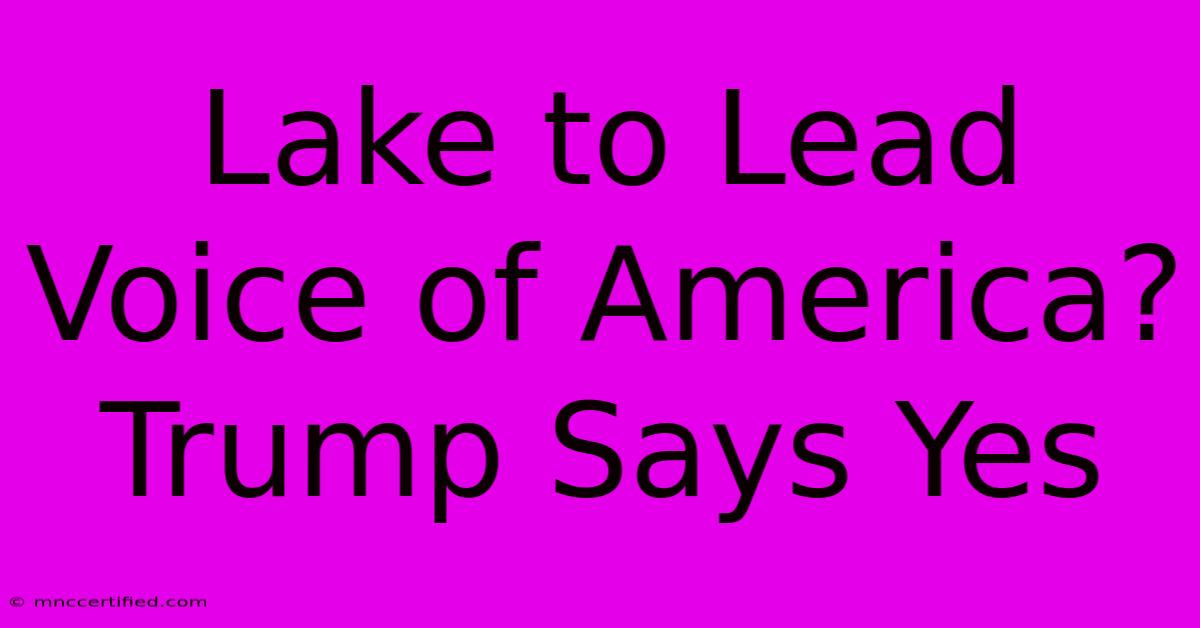Lake To Lead Voice Of America? Trump Says Yes

Table of Contents
Lake to Lead Voice of America? Trump Says Yes: Unpacking the Controversy
The statement, "Lake to Lead Voice of America?" followed by "Trump says yes," immediately sparks controversy. This short, declarative sentence encapsulates a significant shift in proposed leadership for the Voice of America (VOA), a crucial element of US public diplomacy. This article delves into the implications of a potential appointment of Michael Pack, a conservative filmmaker, to lead the VOA, examining the concerns raised and the potential consequences for the organization's credibility and independence.
Understanding the Voice of America (VOA)
The Voice of America is an internationally funded multimedia broadcasting service operating under the United States Agency for Global Media (USAGM). Its mission is to provide accurate, objective news and information to audiences around the world, particularly in regions with restricted access to free press. This commitment to unbiased reporting is crucial to maintaining the VOA's credibility and its influence on global perceptions of the United States. Maintaining its journalistic integrity is paramount to its success.
The Significance of Leadership Appointments
The appointment of the head of USAGM, and consequently the leadership positions within its agencies like the VOA, carries immense weight. These appointments directly impact the editorial direction, operational strategy, and ultimately, the message conveyed to the global audience. A leader with a partisan agenda can jeopardize the VOA's reputation for objectivity and neutrality.
The Pack Appointment: Concerns and Criticisms
Michael Pack's appointment as head of USAGM under the Trump administration raised significant concerns among journalists, media experts, and international observers. Critics pointed to Pack's conservative political views and his past statements expressing skepticism about the objectivity of public broadcasting. The fear was that his leadership would lead to a politicization of the VOA, potentially undermining its ability to serve as a trusted source of news in countries where independent journalism is under threat.
Potential Impacts on VOA's Credibility
The potential for bias introduced through partisan leadership poses a grave threat to the VOA's credibility. If the VOA's reporting is perceived as being influenced by political considerations, its effectiveness as a tool for public diplomacy will be severely diminished. This could lead to a loss of trust among its global audience, a damaging outcome for US foreign policy goals.
Freedom of the Press and International Relations
The controversy surrounding Pack's appointment highlights a broader debate about the role of government in media and the importance of protecting journalistic independence. The VOA's mission is intrinsically linked to the promotion of freedom of the press worldwide. Any perceived compromise of its editorial independence undermines this mission and could negatively impact US relationships with countries that value journalistic freedom.
Long-Term Consequences: Assessing the Damage
The legacy of leadership decisions regarding the VOA extends far beyond the tenure of any single administration. Damage to the organization's reputation for objectivity can take years, even decades, to repair. The appointment of individuals perceived as partisan can sow distrust and erode the public's confidence in the VOA's reporting, impacting its influence and reach.
The Need for Transparency and Accountability
To maintain public trust and ensure the long-term viability of the VOA, transparency and accountability are crucial. The process of selecting leaders for the VOA should be rigorous, transparent, and prioritize candidates with a demonstrable commitment to journalistic ethics and objectivity. Anything less risks damaging a vital tool of US public diplomacy.
Conclusion: Protecting the Integrity of the VOA
The question, "Lake to Lead Voice of America? Trump says yes," remains a potent symbol of the challenges faced by organizations tasked with delivering unbiased news and information in a politically charged environment. Protecting the integrity of the VOA is not merely about upholding journalistic principles; it’s about preserving a vital asset for US foreign policy and promoting freedom of the press globally. The long-term consequences of politicizing such a crucial institution demand careful consideration and a commitment to transparency and accountability in future leadership appointments.

Thank you for visiting our website wich cover about Lake To Lead Voice Of America? Trump Says Yes. We hope the information provided has been useful to you. Feel free to contact us if you have any questions or need further assistance. See you next time and dont miss to bookmark.
Featured Posts
-
Uk Wins Against Asian Hornet
Dec 13, 2024
-
Dalziel Urges Scotland Players To Shine
Dec 13, 2024
-
Mc Cormack Stunned By Rangers Celtic Cup Approach
Dec 13, 2024
-
Manchester United Wins Hojlunds Debut
Dec 13, 2024
-
Advocate Disputes Nancy Maces Foster Care Claim
Dec 13, 2024